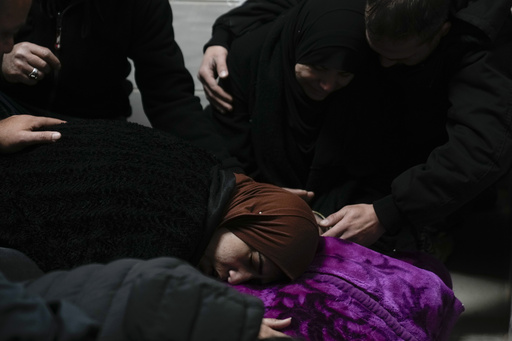
TEL AVIV, Israel — On Sunday, Israeli Prime Minister Benjamin Netanyahu announced plans to meet with U.S. President Donald Trump on Tuesday to address crucial topics including the “victory over Hamas,” strategies to counter Iran, and efforts to strengthen diplomatic ties with Arab nations. This will mark Trump’s first official meeting with a foreign leader since his return to office. The timing coincides with U.S. and Arab mediators working to establish the next phase of a ceasefire agreement aimed at bringing an end to the ongoing conflict in Gaza that has persisted for 15 months.
Hamas has regained authority over Gaza since a ceasefire initiated last month, declaring that it will not free any hostages in the forthcoming phase without a complete cessation of hostilities and a full withdrawal of Israeli forces from the territory. Netanyahu faces increasing pressure from his far-right coalition partners to continue military operations after the current ceasefire phase concludes in early March. He reiterated Israel’s commitment to achieving victory over Hamas and securing the release of all hostages taken during the militant group’s assault on October 7, 2023.
The position of Trump regarding the ongoing conflict remains somewhat ambiguous. Historically a strong supporter of Israel, he has also committed to concluding wars in the Middle East and has taken credit for facilitating the current ceasefire. This temporary agreement has resulted in the release of 18 hostages alongside hundreds of Palestinian detainees held by Israel.
Recently, an Israeli airstrike in central Gaza injured five individuals, including a child who is reported to be in critical condition, as per sources from Al-Awda Hospital. The Israeli military justified their actions, stating the vehicle targeted was bypassing a checkpoint and thus violated the existing ceasefire terms.
Netanyahu expressed his intent to discuss with Trump various critical matters including “victory over Hamas,” the safe return of hostages, and addressing the threats posed by an Iranian-backed coalition of militant groups in the region. Netanyahu stated, “We have the opportunity to enhance security, expand the circle of peace, and embark on an extraordinary era of peace through strength.”
The ongoing conflict erupted when Hamas-led forces invaded southern Israel, claiming the lives of around 1,200 individuals, primarily civilians, along with approximately 250 abductions. Although over 100 hostages were released during a ceasefire in November, the situation remains dire, with only several people found alive. Additionally, Israeli forces have recovered numerous bodies of hostages since the conflict began.
The toll on the Palestinian side has been devastating, with local health authorities reporting over 47,000 fatalities, more than half of whom are said to be women and children, though the exact number of militants among the deceased remains unclarified. The war has decimated vast areas in several urban centers while displacing nearly 90% of Gaza’s population.
In accordance with the ceasefire’s initial phase, Hamas is supposed to release 33 hostages, although they claim eight are deceased, in exchange for nearly 2,000 Palestinian prisoners. Israeli forces have withdrawn from many areas, allowing the return of hundreds of thousands of Palestinians to northern Gaza as humanitarian aid resumes. Negotiations for the subsequent phase, which aims to conclude the conflict and facilitate the return of roughly 60 remaining hostages, are set to commence. Qatari Prime Minister Mohammed bin Abdulrahman bin Jassim Al Thani announced their efforts to engage with the involved parties are ongoing, expressing hopes for movement shortly.
Steve Witkoff, Trump’s envoy for the Middle East, who joined the ceasefire negotiations last month, met with Netanyahu last week, signalling the start of formal discussions for the next phase. Trump is believed to be advocating for a broader agreement, potentially leading to normalization between Israel and Saudi Arabia. However, Saudi Arabia has stipulated that such progress is contingent on the conclusion of the war and the establishment of a viable pathway to Palestinian statehood in territories occupied since the 1967 Middle East conflict.
Jordan’s king has been invited to meet with Trump on February 11, as the nation also endorses Palestinian statehood and has dismissed Trump’s proposal to resettle Palestinians in Jordan or Egypt. Netanyahu’s government, on the other hand, opposes the establishment of a Palestinian state, with key partners, including far-right Finance Minister Bezalel Smotrich, threatening to exit the coalition if military action does not resume next month. This would heighten the risk of early elections which could potentially see Netanyahu ousted.
Many families of hostages and other Israelis are growing increasingly restless. Nissan Kalderon, the brother of a recently released hostage, voiced the anguish of families caught in this protracted situation, highlighting the inhumanity of their ongoing suffering.
As the ceasefire holds in Gaza, Israel has ramped up military operations in the occupied West Bank. The Israeli military expanded its activities in Jenin, claiming the elimination of over 50 “terrorists.” There have been reports of escalating violence, with a 73-year-old man fatally shot by Israeli troops during military operations. Additionally, Israeli airstrikes resulted in several casualties, including two militants believed to be plotting an attack. The military conducted controlled demolitions in Jenin, destroying multiple structures alleged to be used by militants, amid rising violence throughout the West Bank.
The ongoing conflict has heightened tensions and violence in the West Bank, with Israeli military forces conducting frequent raids and a corresponding increase in violent encounters between settlers and Palestinians. As the situation remains precarious, the focus shifts toward potential negotiations that promise a resolution to the enduring conflict.

